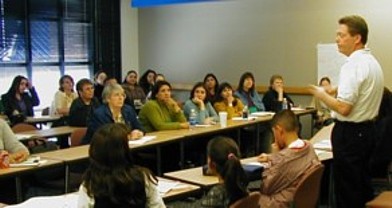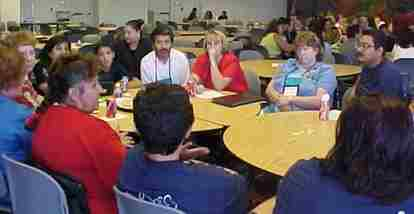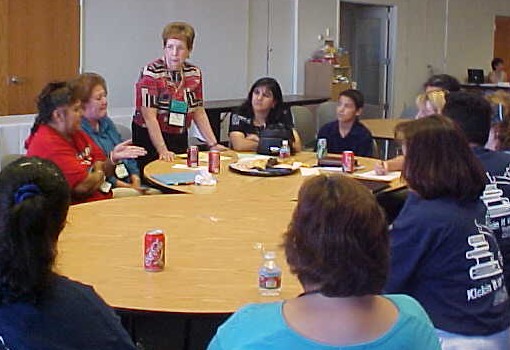Problems with this page?
HELP STOP MISINFORMATION ON BILINGUAL EDUCATION
Respond to misinformation printed in the media by writing letters to the editor, opinion editorial pieces or to reporters. You don't know how? Click here for examples of items published in or sent to various media outlets.
Arizona department OF ED.
Click here for Parental Waiver Application
Click here for the AZ English Aquisition Services link
u.s. department OF ED.
Office of English Language Acquisition You are visitor:

Searching for more articles related to learning English?
Follow this link http://www.asu.edu/educ/epsl/lpru.htm
RESEARCH LINKS
BEHIND ACT--MAJOR REFORMS NEEDED-May 5, 2008 http://www.aaldef.org/docs/AALDEF_LeftintheMargins_NCLB.pdfThe report from the Center on Education Policy titled, "Caught in the Middle - AZ's ELLs and the high school exit exam" is now available on-line at: http://www.cep-dc.org/index.cfm?fuseaction=Page.viewPage&pageId=493&parentID=481 SUMMARY OF RECOMMENDATIONS
The Center on Education Policy offers the following recommendations for policymakers to help better prepare English language learners to pass the exit exam in Arizona. These recommendations grow out of our own observations during our Arizona case study research, suggestions by interviewees, and knowledge gained from our broader research on exit exams. More detail about each of these recommendations can be found in the final section of this report.
Journal of Borderland Education (JBE) is an on-line open source journal that publishes critical, integrative pieces of research and literature pertaining to education and the notions of borders and the borderland. Potential publications should include conceptualizations, interpretations, and syntheses of literature and scholarly work in the respective field and border/borderland issues. (http://education.nmsu.edu/jbe/index.html)
The impact of language and high-stakes testing policies on elementary school English language learners in Arizona. Education Policy Analysis Archives, 14(13). Wright, W. E., & Choi, D. (2006).Retrieved [date] from http://epaa.asu.edu/epaa/v14n13/.
http://www.civilrightsproject.harvard.edu/research/reseg03/intro.pdfJournal of Borderlands Education (JBE) is announcing an inaugural peer-reviewed online journal dedicated to exploring the multiple aspects of borderlands education in and around the United States and abroad. JBE web site: http://education.nmsu.edu/jbe and click on the Guidelines link. To complete the submission process click on the Submissions link, fill out the information, and attach your document.
http://www.blackenterprise.com/yb/ybopen.asp?section=ybng&story_id=84434392&ID=blackenterprise
http://www.blackenterprise.com/yb/ybopen.asp?section=ybng&story_id=84434433&ID=blackenterprise
Academic Achievement of English Language Learners in Post Proposition 203 Arizona. Wayne E. Wright & Chang Pu, University of Texas, San Antonio. Executive Summary:
http://www.asu.edu/educ/epsl/EPRU/documents/EPSL-0509-103-LPRU-exec.pdf http://www.asu.edu/educ/epsl/EPRU/documents/EPSL-0509-103-LPRU.pdfRolstad, K., Mahoney, K., Glass, G. V. (2005). The big picture: A meta-analysis of program effectiveness research on English language learners. Educational Policy, 19, 572-594. Available at http://www.public.asu.edu/~krolstad/big_picture.pdf. It is shown that bilingual education is consistently superior to all-English approaches, and that developmental bilingual education programs are superior to transitional bilingual education programs.
This analysis provides data supporting this statement: "After looking at achievement data, it appears Prop. 227 had no effect on student test scores and reclassification." See the report at http://epaa.asu.edu/epaa/v12n36/v12n36.pdf
Language Policy Research Unit website http://www.asu.edu/educ/epsl/lpru.htm Click on "Research Reports"
"The acquisition of English by children in two-way programs: What does the research say?" Now available for downloading, from http://www.sdkrashen.com.
The full report "Effective Reading Programs for English Language Learners: A Best-Evidence Synthesis:"
http://www.csos.jhu.edu/crespar/techReports/Report66.pdf“The 2002 California English Language Development Test documents the progress of more than 1.3 million English learner students in the state. This report summarizes student achievement as measured by the test and evaluates the rate at which students’ English skills improve. On the whole, student progress is slow, although some groups of students appear to make rapid progress…” http://www.lao.ca.gov/2004/english_learners/021204_english_learners.htm
The Language Policy Research Unit at Arizona State University devotes this site to the law and language policy. The full site is available at http://www.asu.edu/educ/epsl/LPRU/law/
The New Neighbors: A User’s Guide to Data on Immigrants in U.S. Communities, by The Urban Institute with support from the Annie E. Casey Foundation, is a guidebook designed to help local policy makers, program implementers, and advocates use U.S. Census and other data sources to identify immigrant populations in their local communities-their characteristics, their contributions, and their needs. The guidebook lists relevant data sources, the information contained in each, and where they can be located, as well as software needed to use them effectively. This report is available online: www.urban.org/UploadedPDF/310844_the_new_neighbors.pdf.
Language Skills and Earnings: Evidence from Childhood Immigrants [Source: Abstract] Research on the effect of language skills on earnings is complicated by the endogeneity of language skills. This study exploits the phenomenon that younger children learn languages more easily than older children to construct an instrumental variable for language proficiency. Findings indicate a significant positive effect of English proficiency on wages among adults who immigrated to the U.S. as children. Much of this impact appears to be mediated through education. Differences between non-English speaking origin countries and English-speaking ones that might make immigrants from the latter a poor control group for non-language age-at-arrival effects do not drive these findings. http://www.ccis-ucsd.org/PUBLICATIONS/wrkg87.pdf
Special Feature: Frank Monaghan's Entering the List: Campaigning for Bilingual Education on the Net. Published in Language and Education; Vol. 17, No. 4, 2003. © 2003 F. Monaghan.
The Harvard Civil Rights Project just released a study on this. It's at: http://www.civilrightsproject.harvard.edu/news/pressreleases.php/record_id=4
The Chicano Studies Collection was established in 1970 in response to the academic needs of both Chicano students and faculty in higher education. Its purpose was to obtain works by and about Mexican Americans, or Chicanos, in the United States, and to place those materials in a separate library collection. http://www.asu.edu/lib/archives/chicano.htm
The Bilingual Research Journal is a joint project of NABE, the National Association for Bilingual Education, and the Southwest Center for Education Equity and Language Diversity, College of Education, Arizona State University. BRJ Online contains the same material included in the printed (hardcopy) version of the journal. It is not necessary to subscribe to BRJ Online. http://brj.asu.edu/subscribe.html
Is Bilingual Education Bad For You?: Another Bogus Argument Against Bilingual Education. Stephen Krashen. "The following is a critique of two reports by Joseph Guzman that have received wide press coverage: ..." http://www.asu.edu/educ/epsl/LPRU/features/article6.htm
The Amazing Case of Bilingual Education. Stephen Krashen. The rationale for bilingual education is clear, the research is positive, and many people find the rationale reasonable? Why is there so much opposition to bilingual education? Now available at: http://www.eslminiconf.net/september/story8.html
Stephen Krashen: "The major problem is the definition of bilingual education. My response to Guzman is now available at: http://www.irvingisd.net/~spollard/response_to_guzman.htm"
Rand Reading Study Group (2002). Reading for understanding: Toward an R&D program in reading comprehension. Report prepared for the Office of Educational Research and Improvement. Santa Monica: RAND] http://www.rand.org/publications/MR/MR1465/MR1465.pdf
NCELA OUTLOOK A Monthly Online Publication of the National Clearinghouse for English Language Acquisition & Language Instruction Educational Programs (NCELA). http://www.ncela.gwu.edu/newsline/
A National Study of School Effectiveness for Language Minority Students' Long-Term Academic Achievement Final Report: Project. Principal Investigators: Wayne P. Thomas and Virginia P. Collier, George Mason University. http://www.crede.ucsc.edu/research/llaa/1.1_final.html
Collier, V. P., and Thomas, W. P. (2004). "The Astounding Effectiveness of Dual Language Education for All." NABE Journal of Research and Practice 2(1): 1-20. http://njrp.tamu.edu/2004.htm
The Thomas and Collier 1997 national research study summary may be found at: Thomas, W. P., and Collier, V. P. (1997). School Effectiveness for Language Minority Students. National Clearinghouse for Bilingual Education (NCBE) Resource Collection Series, No. 9, December. Available at http://www.ncela.gwu.edu/pubs/resource/effectiveness/thomas-collier97.pdf
Kenji Hakuta, Stanford University (http://www.stanford.edu/~hakuta/index.html) analysis of Oceanside School Distrist : Silence from Oceanside and the Future of Bilingual Education by Kenji Hakuta http://www.stanford.edu/~hakuta/SAT9/Silence from Oceanside.htm
http://www.ncela.gwu.edu/enews/2005/0125.htm#NCELAReleases. NCELA Releases the 2003-2004 State LEP Enrollment Growth Charts for 46 states. These visual aids chart the growth of LEPs over the past ten years, from the school year 1993-94 to 2003-04.
Research: "Limited English Proficient Students: Increased Accountability Under NCLB" From The Civil Rights Project at Harvard By Laura Batt, Jimmy Kim, Gail Sunderman, Dated February 2005 http://www.civilrightsproject.harvard.edu/research/esea/LEP_Policy_Brief.pdf Why support a delayed-gratification approach to language education? Stephen Krashen, published in: The Language Teacher, 28(7), 3-7. (2004). Now available at http://www.sdkrashen.com. May be downloaded and shared with colleagues, students, etc.
No Child Left Behind: Misguided Approach to School Accountability for English Language Learners, which is on the NABE website at http://www.nabe.org/documents/policy_legislation/NABE_on_NCLB.pdf
http://brj.asu.edu/archives/23v21/indexg.html Title: Balkanization, Bilingualism, And Comparisons Of Language Situations At Home And Abroad. ABSTRACT: In this article, the "balkanization argument" made by conservatives for English-Only legislation and against bilingualism is addressed. The argument here is that the United States faces the sort of linguistic divisions found in other countries. Most frequently invoked are the cases of Canada and Belgium.
Arizona Debate continues...
AABE is a NABE Affiliate Member
Problems with this page? Contact asotomayor@azbilingualed.org





